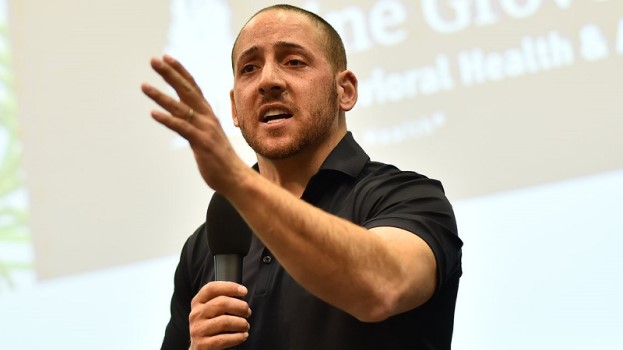After his attempted suicide, mental health campaigner Kevin Hines (pictured) brings a message of hope to anyone suffering in silence.

Kevin, what happened on 24 September 2000?
I got off the bus and walked slowly down the walkway of the Golden Gate Bridge. People rode by me, drove by me, walked by me. I catapulted myself into freefall. In four seconds, I fell 75 mph, 25 storeys. And I hit the water. I was in the most physical pain I had ever experienced.
Did anyone try to stop you?
No. A woman approached me and asked, 'Will you take my picture?' She said thanks and walked away. It was that moment I thought, 'nobody cares'. The reality was that everybody cared but I just couldn’t see it. The millisecond my hands left the rail, it was an instant regret. And I remember thinking, 'No-one’s going to know that I didn’t want to die.'
What happened when you hit the water?
The Coast Guard dove in and brought me on board.
What was it like seeing your family in hospital?
My father took one step into the hospital room and I looked up at him and said, 'Dad, I’m sorry.' And he said, 'No Kevin, I’m sorry.' Both of our immediate reactions were guilt, guilt that didn’t belong to either of us. And even though I didn’t die, I caused people a great deal of grief and pain.
Were there repercussions for a long time afterwards?
Yes. The day of my attempt still sits within them today. I asked my father if he still feared my death by suicide. He said every time the phone goes off his first inclination is, is Kevin alive? I had that impact on my dad.
Did you write a suicide note before your attempt?
Yes, I vividly remember writing it. People don’t get it, like I thought I was a burden to everyone who loved me, because that’s what my brain told me, because that’s how powerful your brain is.
What was the background to all of this?
I was born on drugs and premature, and then I bounced around from home to home. Nobody wanted to keep me because I was sick. Eventually I got lucky, I landed in the home of Patrick and Debra Hines. I had a great childhood. I thought growing up that everything was going to be great.
When did things take a turn for the worse?
At 17, it all came crashing down. If you can imagine feeling that everyone around you is out to get you, trying to hurt you, and trying to kill you. And you believe that to be the truth. From the extreme paranoia, I exhibited symptoms of mania. From the mania, came the hallucinations, both auditory and visual. With that and the bipolar disorder, I just spiralled out of control.
But you recovered after your suicide attempt. What did you do?
The road to recovery was pretty long. I had seven psych ward stays in the next 11 years. I still have all the symptoms I’ve had before: mania, depression, psychosis and hallucinations. I just know how to cope with it, and I know how to beat it. I built a support network over these years of treatment so I wouldn’t be fighting this alone. It’s okay not to be okay. It’s not okay not to ask for someone to back you up.
How has your experience changed you?
I feel lucky to be alive every single day.
What advice would you give people who are struggling?
Today, no matter the pain I’m in, no matter the struggles I experience, I believe that life is the greatest gift we’ve ever been given. If you’re suffering mentally, don’t wait like I did, sitting in denial for so long. Recovery happens. I’m living proof.
If you need support in times of crisis:
Samaritans.org
Emotional support 24/7, 365 days a year.
Phone: 116 123 (freephone)
Email: jo@samaritans.org
Find out more
Mental wellbeing: where to get help and how to offer it to others who may be struggling
Tags
- Health and Wellbeing
